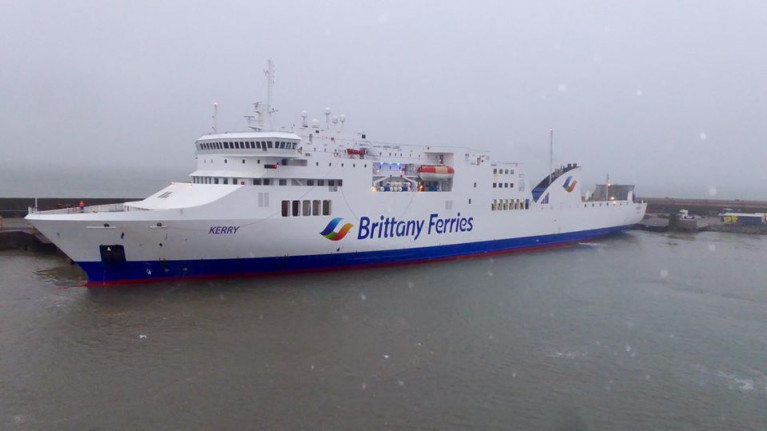There is further suspension of Brittany Ferries passenger services as a consequence of the on-going Coronavirus (COVID-19) crisis which Afloat adds the French ferry operator has posted on its website, so click for updates.
According to Brittany Ferries this is in response to changing government policy in France, Spain and Ireland, and to protect all passengers and crew members at this difficult time. This decision has not been taken lightly, but has been taken in the best interest of all.
Changes France-Ireland routes:
Brittany Ferries will cease its weekly rotation connecting Roscoff in France with Rosslare Europort (however Afloat adds the new seasonal service was scheduled to start next Monday, 23 March). Afloat also adds the seasonal Cork-Roscoff route was to begin tomorrow, St. Patrick's Day, however sailings have been re-scheduled to Saturday, 11 April, according to their 'Irish' website.
The French operator added that the Kerry will however continue two rotations per week, carrying freight between Rosslare and Bilbao in Spain as Afloat previously reported on Saturday. (Since then Afloat adds the ropax ferry was tracked this afternoon arriving at Rosslare with the last 'passenger' service prior to becoming freight-only).
We are systematically contacting all affected customers by telephone, email and SMS but there is enormous pressure on our contact centre staff. The speed of response may not be up to its usual standard for which Brittany Ferries apologises in advance. Passengers are being asked not to contact us by telephone but to visit website: www.brittany-ferries.co.uk/routes/sailing-updates (scroll down for Irish routes) for the latest information.
Brittany Ferries very much regrets the effect that this ongoing disruption will have on customers. Directors will continue to monitor the situation with a view to resuming normal service as soon as the situation allows.
We respectfully ask all customers who are not booked to travel within the next two weeks to delay contacting our customer call centres. In addition, normal two-way interaction via social media may not be possible due to the volume of enquiries and availability of staff. Brittany Ferries apologises in advance for delays in usual response times.
As outlined below there are other changes on Brittany Ferries network from the UK to France and Spain.
Changes UK-France routes:
- Cherbourg to Poole service – Barfleur (until 23 March at least)
The last sailing will leave Cherbourg tonight 16 March 2020 at 21:45 for Poole.
- St Malo to Portsmouth service – Bretagne (until 24 March at least)
The last sailing will leave St Malo on Tuesday 17 March at 20:30 for Portsmouth
- Roscoff to Plymouth service – Armorique (until 26 March at least)
The last sailing will leave Roscoff on Wednesday 18 March at 15:00 destined for Plymouth
As things stand, sailings between Portsmouth and Caen on Mont St Michel and Normandie will continue as normal, for passengers and freight.
Changes UK-Spain routes:
For now ships serving routes connecting Spain with the UK will continue to sail. However, they will only carry passengers who must return home, therefore offering a lifeline-only service for British and Spanish whose travel is essential. Freight will continue to be carried as normal.






























































